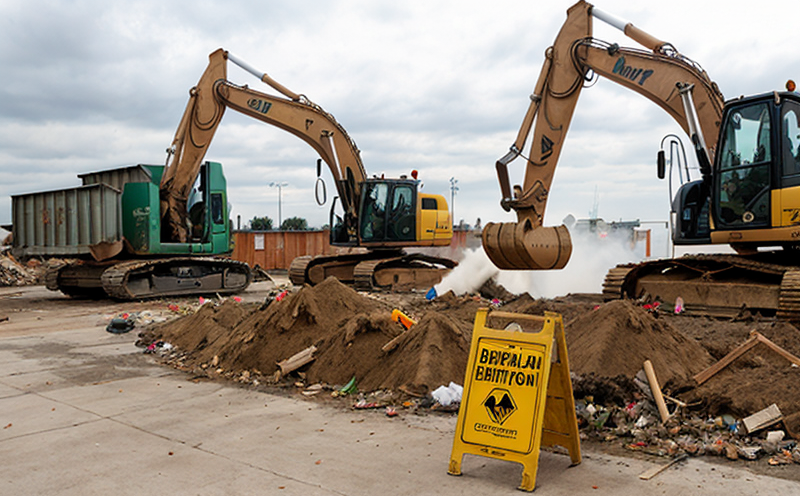EN 1097-6 Density of Recycled C&D Aggregates
The European Standard EN 1097-6 specifies the methods for determining the density of recycled construction and demolition (C&D) aggregates. This standard is crucial in ensuring that recycled materials meet quality requirements, enhancing sustainability practices in the construction industry.
Recycled C&D aggregates are a vital component in modern construction projects due to their environmental benefits and cost-effectiveness. However, for these materials to be effectively utilized, it's essential to determine their density accurately. The EN 1097-6 protocol provides a standardized approach to measuring this critical parameter.
The test procedure involves several steps that ensure precise measurement. Initially, the specimen is prepared by selecting a representative sample of the recycled C&D aggregates. This step ensures that the results are reflective of the overall material quality. The sample is then conditioned according to the standard's requirements, which might include drying or moistening procedures depending on the aggregate type.
The next stage involves using specific instrumentation designed for density measurement. For instance, a pycnometer may be used to determine the bulk density of the aggregates. This device measures the mass of the sample both with and without the container, allowing for accurate calculations of volume and density. Additionally, hydrostatic weighing can be employed for measuring apparent or true densities.
Accurate density measurement is essential as it directly impacts the performance and durability of the final construction product. For example, higher-density aggregates may lead to stronger concrete mixes but could also increase production costs. Conversely, lower-density materials might reduce transportation expenses but compromise structural integrity. Therefore, adhering strictly to EN 1097-6 ensures that recycled C&D aggregates are used optimally in various applications.
The standard also provides guidelines for reporting the results, which include both numerical values and graphical representations where applicable. This transparency allows stakeholders to make informed decisions about material usage. Furthermore, compliance with this standard is increasingly being mandated by environmental regulations, making it a crucial aspect of sustainable construction practices.
In summary, EN 1097-6 plays a pivotal role in the testing and quality assurance of recycled C&D aggregates. By following its procedures meticulously, professionals can ensure that these materials are used efficiently while maintaining high standards of environmental responsibility.
Benefits
Adopting the EN 1097-6 standard for density testing offers numerous benefits to various stakeholders involved in construction projects:
- Enhanced Material Quality Assurance: Ensures that recycled C&D aggregates meet specified quality standards, promoting consistent performance across different applications.
- Sustainability: By accurately measuring the density of these materials, constructors can maximize their environmental footprint by utilizing high-density aggregates where necessary and reducing waste in less critical areas.
- Economic Efficiency: Properly tested materials allow for optimized use, potentially lowering costs associated with transportation and material procurement.
- Regulatory Compliance: Adherence to international standards like EN 1097-6 helps construction companies meet regulatory requirements, avoiding potential penalties and enhancing their reputation.
Beyond these immediate advantages, incorporating this testing method into daily operations can lead to long-term improvements in project planning and execution, ultimately contributing to more resilient and sustainable structures.
Eurolab Advantages
As a leading laboratory specializing in waste management and recycling testing, Eurolab offers several advantages when it comes to conducting EN 1097-6 density tests:
- State-of-the-Art Equipment: Our facility is equipped with the latest instrumentation necessary for precise measurement of bulk densities.
- Experienced Staff: Our team comprises highly skilled professionals who are thoroughly trained in executing this standard accurately and efficiently.
- Comprehensive Reporting Services: Beyond just providing numerical results, we offer detailed reports that include all necessary documentation for compliance purposes.
- Rapid Turnaround Times: We understand the importance of timely test results in project timelines. Our streamlined processes ensure quick delivery without compromising on quality.
Choosing Eurolab means leveraging our expertise and resources to ensure that your construction projects incorporate recycled C&D aggregates optimally, thereby contributing positively to both environmental sustainability goals and business efficiency objectives.
Why Choose This Test
Selecting the EN 1097-6 density test for recycled C&D aggregates is imperative due to its comprehensive approach to quality assurance:
- International Recognition: Complying with this standard ensures that your materials are recognized globally, facilitating smoother international trade and collaboration.
- Standardized Methodology: The protocol provides a uniform method for measurement across different laboratories, ensuring consistent results worldwide.
- Informed Decision-Making: Accurate density data informs critical decisions regarding material usage, helping to optimize designs and reduce waste.
- Credibility: Adherence to international standards enhances your company's credibility among clients and partners, fostering trust in your products and services.
In a competitive market where sustainability is increasingly valued, choosing the right testing methods sets you apart as a leader committed to environmental stewardship. This commitment not only aligns with global trends but also opens up new markets and opportunities for growth.





